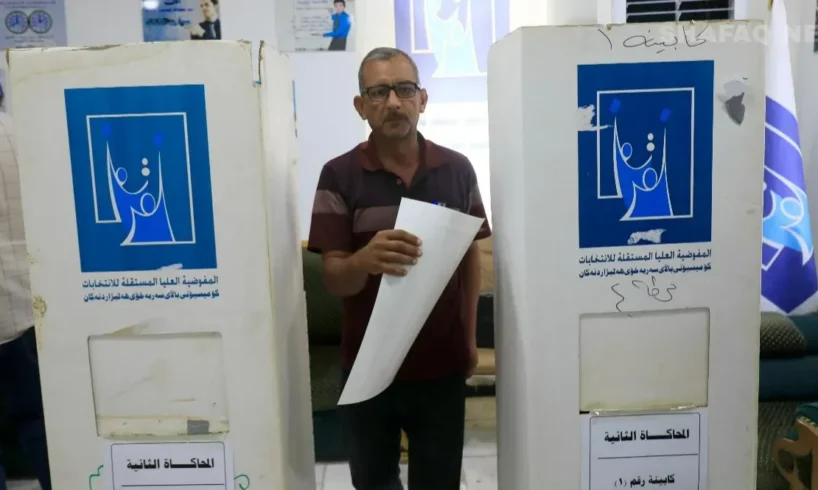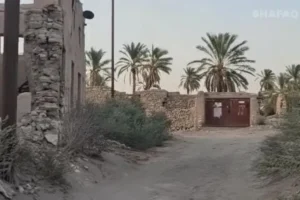
Shafaq News
Iraq prepares for its parliamentary elections on November
11, 2025, and the promise of democracy faces its toughest test — not inside
parliament halls, but in the alleys where desperation often speaks louder than
conviction.
In a nation where poverty and politics often overlap, the
boundary between choice and necessity is fading, leaving many Iraqis to view
the ballot not as a tool of change but as a means of survival.
Cards for Cash
In a modest Baghdad neighborhood, Um Dua, 60, handed over
her voter card to a campaign representative in exchange for a small bag of food
and 100,000 dinars (about $76) — barely enough to buy her medicine.
“I needed money to buy my prescriptions,” she told Shafaq
News. After receiving the payment, she surrendered her card and decided not to
vote at all. “I expect nothing from the candidates,” she added quietly.
Around her, the scene has become routine. As elections draw
near, the narrow streets of the capital’s poor districts fill with campaign
vehicles and emissaries seeking voter cards. The offers vary — cash, food, or
monthly stipends — depending on the district, the candidate’s influence, and
even the voter’s age.
For 22-year-old Raaed Al-Aboudi, the transaction came with
better terms. “One campaign official offered me $200 in exchange for my card,
to ensure my loyalty on election day,” he recounted to Shafaq News.
But Al-Aboudi decided to negotiate. “I asked for fixed
monthly payments of no less than 150,000 dinars (about $114) until the
elections, and they agreed. It became a steady income for over two months,” he
shrugged, saying such practices have become customary among voters, especially
the youth.
Read more: Financial muscle: How money shapes Iraq’s upcoming elections
Ballot Card Futures
What happens in Baghdad’s alleys is part of a larger,
carefully organized trade — one that turns voter cards into political currency.
Abu Abdullah Al-Saadi, who helps manage campaign promotion
for a list in the al-Rusafa district, described how it works. “Campaigning is
not easy, especially for new candidates who are unknown in their districts,” he
explained to our agency.
“Buying voters’ loyalty — not just their cards — becomes
necessary. Most voters offer their cards for sale at varying prices depending
on their neighborhoods.”
He went on to outline how the market functions. “The price
of a voter card in Zayouna differs from that in Al-Fadhiliya, Hay Al-Maamil, or
Hay Al-Amin. Buying a card also requires ensuring that the seller actually
votes on election day — and that’s the hard part.”
To manage that uncertainty, campaigns often pay in stages,
with the last payment made only after the vote. Many also arrange
transportation to polling centers, ensuring that “secured” voters cast their
ballots as promised. “There is always a risk the voter won’t honor the
agreement,” Al-Saadi noted, “and that means a financial loss for the candidate,
especially as prices rise closer to the election.”
However, not every purchase aims to win a vote. Some
political blocs buy cards simply to remove them from circulation, preventing
rival candidates from benefiting. In parts of Baghdad — notably al-Mansour,
Karada, and al-Jadriyah — voters have been offered up to one million dinars
(about $760) to destroy their biometric cards altogether.
Read more: Iraq’s 2025 Elections: Mass candidacy, minimal reform, and crisis of democracy
Biometric Deceit
Beyond these street deals lies a more sophisticated layer of
interference. Speaking on condition of anonymity, an expert familiar with
Iraq’s biometric enrollment system detailed how voter data can be exploited to
falsify identities.
“Powerful individuals linked to certain candidates often
collect voter identification cards to extract personal information — names,
numbers, and other data printed on the cards.” These details are then entered
into the registration system during the enrollment phase, where they are paired
with fingerprints that do not belong to the real cardholders — sometimes from
another person, or even a fabricated print.
When biometric verification is required on election day, the
system matches that false fingerprint, allowing someone else to vote in place
of the legitimate voter. This manipulation, he clarified, may involve temporary
or permanent collection of voter cards, or even collusion with registration
center staff.
If the biometric system, he pointed, lacks features such as
liveness detection — technology that ensures the fingerprint comes from a
living person — or strong audit logs, fraud becomes easier to commit and harder
to trace.
These vulnerabilities have had real consequences before.
During the 2018 parliamentary elections, independent monitors such as the
European Union Election Observation Mission (EU EOM) identified irregularities
in over 80 percent of polling stations, prompting the Independent High
Electoral Commission (IHEC) to annul results at 1,021 polling centers.
In 2021, despite new technology, thousands of complaints
emerged over vote buying, intimidation, and manipulation. The Commission later
maintained that “no proof of systematic fraud” was found — yet the sheer number
of complaints deepened public mistrust.
Read more: The uncivil war: Iraq’s election frenzy
Securing the Vote
Even so, IHEC insists it is closing those loopholes. Ahead
of the upcoming elections, the commission has introduced new measures to
strengthen transparency and restore confidence in the process.
Among the reforms: the elimination of indelible ink, full
reliance on biometric voter cards, and electronic verification systems. For
voters whose fingerprints are unreadable — about 5 percent of participants —
polling stations will use facial-recognition cameras instead.
Civil society observers and monitoring teams will also be
stationed at polling centers to track instances of vote buying, intimidation,
and card trading.
The reforms follow mounting public pressure for cleaner
elections after the 2021 vote, which saw a historically low turnout. This year,
nearly 7,900 candidates are running for parliament. Out of roughly 30 million
eligible Iraqis, about 21.4 million have completed voter registration, while
another seven million will not participate because they have not renewed their biometric
cards.
Impossible Fraud?
Despite the criticism, election officials insist that
impersonation and voter card misuse are virtually impossible. “It is nearly
impossible to use someone else’s voter card. Doing so is illegal,” affirmed
Nebras Abu Soudah, deputy spokesperson for IHEC.
She also explained that the system requires triple biometric
verification — the live fingerprint, the fingerprint on the card, and the
fingerprint stored in the verification device. “All three must match, and this
cannot happen without the voter present.”
Her colleague, Jumana al-Ghalay, confirmed that Iraq’s
Election Law No. 12 of 2018 provides for prison terms of no less than one year
for anyone who offers or promises benefits to influence a voter’s choice or
prevent participation. “The law also applies to those who use threats or
force,” she noted.
Al-Ghalay further mentioned that no official complaints have
been recorded so far, emphasizing that the voting system is “fully protected,
relying on encrypted codes that prevent any party, including the commission
itself, from identifying voters’ choices.”
Read more: Money, power, and ballots: Iraq’s struggle against electoral fraud
Written and edited by Shafaq News staff.





